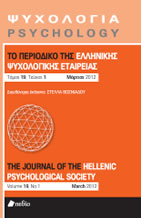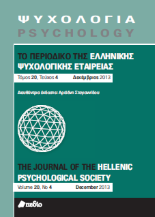Empowering Parents: a pilot intervention for mothers of elementary school aged children in the community

Abstract
Quality of family life is one of the most important factors in the prevention of psychological disorders in children and adolescents. The present study describes and evaluates a pilot intervention, targeting a group of parents of elementary school-aged children. The intervention focused on primary prevention of disorders through promoting mental health and strengthening protective factors for positive family functioning. Sessions took place at the Community Mental Health Center of UMHRI and lasted one school year. The group, which consisted of seven mothers, was conducted bimonthly, and was facilitated by two psychologists. The topics of the 13 sessions were predetermined and were chosen based on the needs of the participating mothers and on the developmental stage of their children. The intervention was evaluated through a mixed methodology approach; quantitatively through the administration of a satisfaction questionnaire at the end of the program, and qualitatively through semi-structured observations conducted during the course of the intervention. The results signify the importance of supporting parents in their role. All mothers reported being very satisfied from the group and feeling more able to respond to the demands of their parental role as well as to the needs of their children.
Additionally, the group process signified certain themes that are important to parents, such as the influence of the school and its teachers on their children’s lives. The encouraging results of this pilot study lead to the wider implementation of similar such interventions in the community.
Article Details
- How to Cite
-
Οικονόμου Μ., Τσαλιάγκου Ε., Γερουλάνου Κ., Πέππου Λ., & Στεφάνης Κ. (2020). Empowering Parents: a pilot intervention for mothers of elementary school aged children in the community. Psychology: The Journal of the Hellenic Psychological Society, 19(3), 263–280. https://doi.org/10.12681/psy_hps.23622
- Issue
- Vol. 19 No. 3 (2012)
- Section
- RESEARCH PAPERS

This work is licensed under a Creative Commons Attribution-ShareAlike 4.0 International License.
The journal PSYCHOLOGY adopts a Platinum open-access policy. Submission, processing or publication costs are waived by the Hellenic Psychological Society. Papers published in the journal PSYCHOLOGY are licensed under a 'Creative Commons Attribution-ShareAlike 4.0 International' licence. The authors reserve the copyright of their work and grant the journal the right of its first publication. Third-party licensees are allowed to use the published paper immediately after publication as they wish, provided they retain the defined by the license copyright formalities, regarding the reference to its author(s) and its initial publication in the journal PSYCHOLOGY. Moreover, any adjusted work should be shared under the same reuse rights, so with the same CC license.




